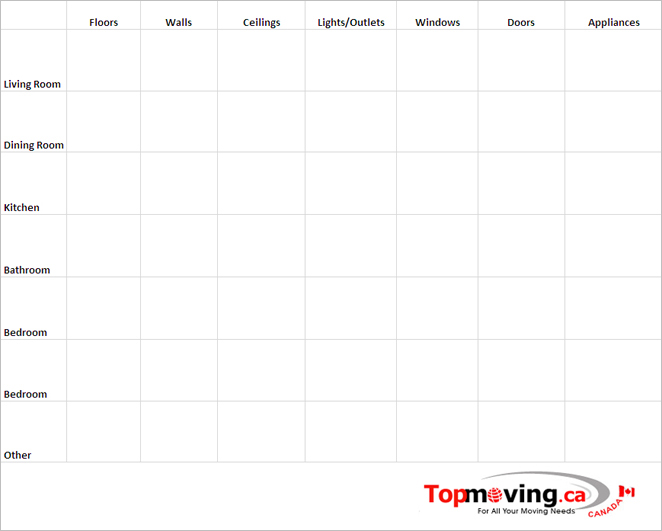| The first thing that must be done if you are renting an apartment or home from someone else is to complete a move-in inspection checklist the day you move in.
Ask for an inspection checklist
After you have signed the lease but before you move anything into the apartment, fill out a move-in inspection checklist to take note of any damages. Oftentimes landlords will provide these checklists for you, but if one wasn't included with your move-in information, ask for it.
Does the landlord or rental office not have any inspection checklists for their residents/tenants? Make your own or feel free to use the one we have provided for you below (or you can download a PDF version of it):

Completing an inspection
Begin your inspection before you move any furniture into your new rental. This is especially important because you want to take note of damages that existed before your move in. Finding an unsightly scratch on the wall can be difficult if your tall bedroom dresser is covering it.
To complete your inspection, go from room to room and look around carefully, taking note of any minor or major problems you see.
Rooms to check
Give all rooms a proper going over to ensure there is no damage, paying careful attention to existing items in the following rooms.
- Living room - floors, walls, ceiling, light fixtures, light switches, outlets
- Dining room - floors, walls, ceiling, light fixtures, light switches, outlets
- Bathroom(s) - sink, cabinets, counters, pipes, toilet, bathtub and/or shower, floors, walls, ceiling, light fixtures, light switches, outlets
- Kitchen - sink, cabinets, counters, pipes, refrigerator, microwave, stove, floors, walls, ceiling, light fixtures, light switches, outlets
- Bedroom(s) - floors, walls, ceiling, light fixtures, light switches, outlets
- Any other rooms that may be in your rental
Things to look for
In each room you inspect, take note of the condition of each existing item and/or the furnishings, paying particularly careful attention to broken, stained or damaged areas and appliances.
These are just a few of the things you should be asking yourself as you look through your rental property.
- Hardwood floors, tile floors and carpets
- Are there any scuff marks, cracked or missing tiles, burn marks, bad smells or discoloration?
- Do you notice any indications of a pest problem?
- Walls
- Are there any scratches, cracks, stains, chipped paint or holes?
- Are the baseboards all attached securely and in good shape?
- Ceilings
- Are there any cracks or leaks?
- Do all the smoke and carbon monoxide detectors work properly?
- Light fixtures and outlets
- Does everything work, is anything broken?
- How does the fuse box look?
- Does every outlet and light switch have a faceplate?
- Do the AC, heating units and thermostats all work?
- Windows
- Are the screens broken or damaged, is the glass cracked, do you feel a breeze?
- Can the windows be opened/locked and are they mold and mildew free?
- Are the blinds clean and undamaged?
- Doors
- Do all the locks and keys work?
- Is the door bent, scuffed, scratched, damaged or letting in too much air?
- Appliances/utilities
- Is everything in working order, is there any visible damage?
- Does the hot and cold water work properly?
- Are any pipes leaking or drains not running properly?
- Are the fridge and freezer cold, does the oven turn on?
If there is damage
On the off chance that there is damage to your apartment, document any and all problems before you move in.
Take photos, write down the specific issues and hand them over to your landlord so that when it's time for you to move out, the damages inflicted by the previous tenant are not taken out of your security deposit.
Hopefully, said landlord will also fix these concerns in addition to noting them for your future move out day.
Moving out
Of course, this same procedure will also occur when you move out and you may be liable for any damages you have caused beyond the normal wear and tear of living in a rental property.
What we're saying is, if you want to get your money back, treat your rental as kindly as if it were your own.
|